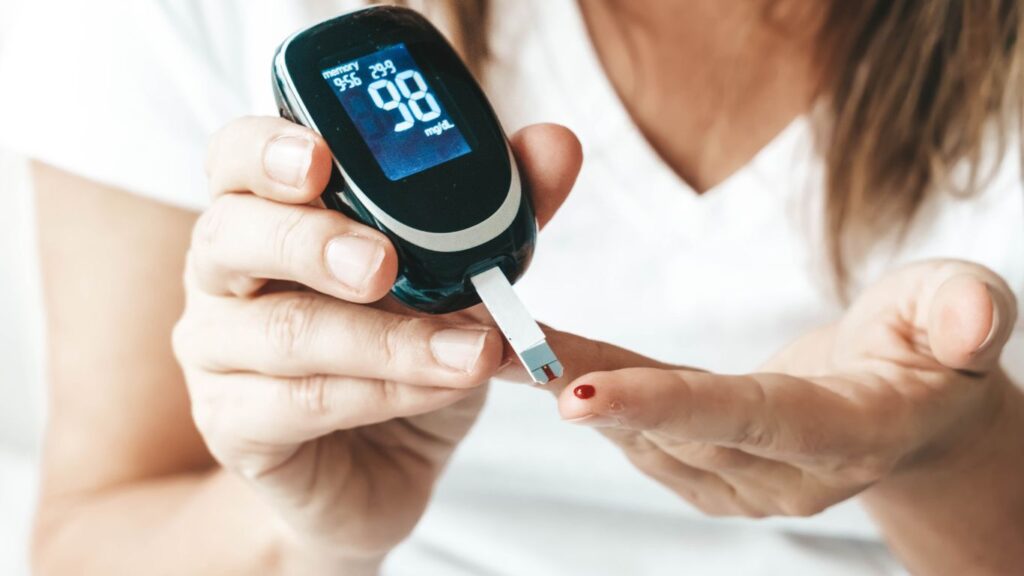
Weather conditions can have a significant impact on blood sugar levels. In colder weather, the body tends to work harder to maintain its core temperature, which can lead to higher blood sugar levels as the body releases more glucose to fuel this effort. Also, cold weather can decrease blood circulation to the extremities, further contributing to elevated blood sugar levels. On the other hand, hot weather can also affect blood sugar levels. High temperatures can cause dehydration, leading to a higher concentration of glucose in the blood. Moreover, extreme heat can affect insulin absorption rates, potentially causing blood sugar levels to fluctuate.
Therefore, it’s important for individuals with high blood sugar to closely monitor their blood sugar levels and adjust their insulin or medication doses as needed to maintain stable blood sugar levels, especially during extreme weather conditions. Managing blood sugar levels during hot summer weather requires extra attention. Here are some tips to help you manage diabetes during the hot summer months:
- Stay hydrated: Drink plenty of water throughout the day to stay hydrated, especially when it’s hot outside. Dehydration can adversely affect blood sugar levels and lead to complications. Avoid sugary beverages and choose water or other sugar-free beverages. Look for signs of dehydration like less urination, dark urine, dizziness, dry mouth or eyes, headache, etc. If you experience symptoms of dehydration or heat-related illness, such as excessive thirst, weakness, or confusion, seek medical attention immediately.
- Monitor blood sugar levels frequently: Keep a close eye on your blood sugar levels, as they may fluctuate more in hot weather due to increased activity levels and changes in diet. Test your blood sugar regularly through a home kit and lab tests and adjust your insulin or medication doses as needed. Avoid alcohol and drinks containing caffeine, for example, coffee and energy or sports drinks. Some aerated cold drinks also have high levels of caffeine. They can lead to water loss and shoot up your blood sugar levels. High heat can alter how your body uses insulin. There may be a risk for both high and low blood glucose levels during summer, so be prepared.
- Protect your medications and supplies: Insulin and other diabetes medications, test strips, and equipment should be stored properly to prevent them from being affected by high temperatures. Heat can degrade insulin. Keep them in a cool, dry place and avoid leaving them in direct sunlight or in a hot car. Insulin is sensitive to temperatures that are too high or too low. You must store all the insulin vials in the refrigerator. If you are traveling, store all blood sugar medicines and equipment in a cooler.
- Dress appropriately: Wear lightweight, breathable clothing to stay cool in the heat. Avoid tight-fitting clothes that can restrict circulation. If you are going to be in the sun for an extended period, wear a hat and sunglasses to protect yourself from sunburn and heatstroke. Protect your skin from sunburn by applying sunscreen with a high SPF to prevent skin damage. Do not go barefoot in hot weather on a beach or poolside.
- Plan your meals and snacks: Stick to your regular meal plan as much as possible, but be mindful of the heat’s effects on your appetite and energy levels. Opt for lighter, refreshing meals and snacks that won’t weigh you down. Include plenty of fruits and vegetables, which are high in water content and can help keep you hydrated. Avoid heavy, starchy foods that can make you feel sluggish. Eating smaller, more frequent meals throughout the day can help maintain steady blood sugar levels. While it’s tempting to indulge in ice cream or cold sugary drinks to cool down, these can cause rapid spikes in blood sugar levels. Opt for sugar-free or low-sugar alternatives, or enjoy small portions in moderation.
- Be cautious with alcohol: If you choose to drink alcohol, do so in moderation and be aware of its effects on blood sugar levels. Alcohol can cause hypoglycemia (low blood sugar) if consumed on an empty stomach or in excess, so be sure to eat before drinking and monitor your blood sugar closely. If you choose to drink alcohol, do so in moderation and accompany it with plenty of water.
- Exercise safely: Stay active during the summer months but be mindful of the heat and its effects on your body. Avoid too much strain during exercise. Exercise early in the morning or later in the evening when temperatures are cooler and avoid strenuous activity during the hottest parts of the day. Drink plenty of water before, during, and after exercise to stay hydrated.
- Check Blood Sugar Levels Frequently: Monitor your blood sugar levels more frequently than usual, as hot weather can impact insulin sensitivity and metabolism. Adjust your insulin or medication doses as needed under the guidance of your healthcare provider. During hot weather conditions sometimes sugar level drops quite low (hypoglycemia). When this develops, you may start feeling confused, and anxious or develop blurred vision. Your heart rate may increase, and you might feel a lot of sweating. In extreme cases, you may lose consciousness. Always carry glucose, candies, or some sweet fruits for instant sugar.
- Stay Cool and Rested: Lastly, prioritize staying cool and rested during hot weather. Avoid prolonged exposure to high temperatures, especially during peak hours of the day. Rest in air-conditioned or shaded areas, when possible, to prevent overheating. Keep drinking plenty of fluids to regulate body temperature. If planning a day outing, public places like shopping malls that are air-conditioned are better than crowded local markets.
- Be prepared for emergencies: Keep a supply of glucose tablets in case of sudden low sugar, and make sure your friends and family know how to recognize and respond to an emergency.
By following these tips and staying vigilant about managing your blood sugar, you can stay healthy and enjoy the summer months safely without any major problems.